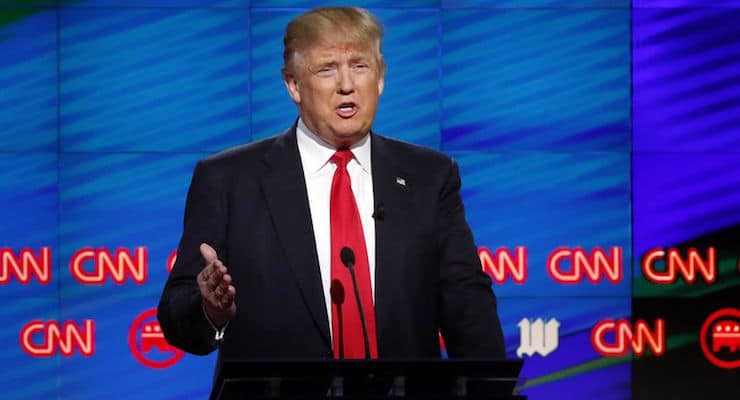

“So far I cannot believe how civil it’s been up here,” Donald J. Trump said at the Republican debate hosted by CNN in Florida. The comment came a mild exchange with Sen. Ted Cruz over the senator’s flip-flops on ethanol and immigration. (Photo: AP)
On one of my first trips to New Hampshire in 1991, to challenge President George H. W. Bush, I ran into Sen. Eugene McCarthy.
He was returning to the scene of his ’68 triumph, when he had inflicted the first crippling wound on Lyndon Johnson.
“Pat, you don’t have to win up here, you know,” he assured me. “All you have to do is beat the point spread.”
“Beat the point spread” is a good description of what Donald Trump has to do in Monday night’s debate.
With only a year in national politics, he does not have to show a mastery of foreign and domestic policy details. Rather, he has to do what John F. Kennedy did in 1960, and what Ronald Reagan did in 1980.
He has to meet and exceed expectations, which are not terribly high. He has to convince a plurality of voters, who seem prepared to vote for him, that he’s not a terrible risk, and that he will be a president of whom they can be proud.
He has to show the country a Trump that contradicts the caricature created by those who dominate our politics, culture and press.
The Trump on stage at Hofstra University will have 90 minutes to show that the malicious cartoon of Donald Trump is a libelous lie.
He can do it, for he did it at the Mexico City press conference with President Pena Nieto where he surprised his allies and stunned his adversaries.
Recall. Kennedy and Reagan, too, came into their debates with a crucial slice of the electorate undecided but ready to vote for them if each could relieve the voters’ anxieties about his being within reach of the button to launch a nuclear war.
Kennedy won the first debate, not because he offered more convincing arguments or more details on the issues, but because he appeared more lucid, likable and charismatic, more mature than folks had thought. And he seemed to point to a brighter, more challenging future for which the country was prepared after Ike.
After that first debate, Americans could see JFK sitting in the Oval Office.
Reagan won his debate with Carter because his sunny disposition and demeanor and his “There you go again!” airy dismissal of Carter’s nit-picking contradicted the malevolent media-created caricatures of the Gipper as a dangerous primitive or an amiable dunce.
Even George W. Bush, who, according to most judges, did not win a single debate against Al Gore or John Kerry, came off as a levelheaded fellow who was more relatable than the inventor of the internet or the windsurfer of Cape Cod.
The winner of presidential debates is not the one who compiles the most debating points. It is the one whom the audience decides they like, and can be comfortable taking a chance on.
Trump has the same imperative and same opportunity as JFK and Reagan. For the anticipated audience, of Super Bowl size, will be there to see him, not her. He is the challenger who fills up the sports arenas with the tens and scores of thousands, not Hillary Clinton.
If she were debating John Kasich or Jeb Bush, neither the viewing audience nor the title-fight excitement of Monday night would be there. Specifically, what does Trump need to do? He needs to show that he can be presidential. He needs to speak with confidence, but not cockiness, and to deal with Clinton’s attacks directly, but with dignity and not disrespect. And humor always helps.
Clinton has a more difficult assignment.
America knows she knows the issues. But two-thirds of the country does not believe her to be honest or trustworthy. As her small crowds show, she sets no one on fire. Blacks, Hispanics and millenials who invested high hopes in Barack Obama seem to have no great hopes for her. She has no bold agenda, no New Deal or New Frontier.
“Why aren’t I 50 points ahead?” wailed Hillary Clinton this week.
The answer is simple. America has seen enough of her and has no great desire to see any more; and she cannot change an impression hardened over 25 years — in 90 minutes.
But the country will accept her, if the only alternative is the Trump of the mainstream media’s portrayal. Hence, the strategy of the Democratic Party for the next seven weeks is obvious:
Trash Trump, take him down, make him intolerable, and we win.
No matter how she performs though, Donald Trump can win the debate, for he is the one over whom the question marks hang. But he is also the one who can dissipate and destroy them with a presidential performance.
In that sense, this debate and this election are Trump’s to win.






